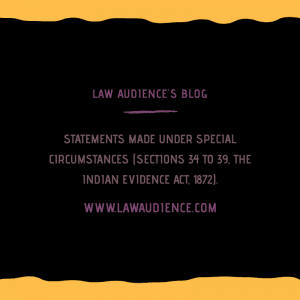AUTHORED BY: MS. KAJAL KUKREJA, LL.B, FINAL YEAR STUDENT AT NEW LAW COLLEGE, BHARATI VIDYAPEETH DEEMED UNIVERSITY & RESEARCH WRITER AT LAW AUDIENCE: EDITED BY: MS. PRIYA KUSHWAH, B.A.LL.B, STUDENT AT NATIONAL UNIVERSITY OF STUDY AND RESEARCH IN LAW, RANCHI & ASSISTANT EDITOR AT LAW AUDIENCE.
I. ABSTRACT:
This article is aimed at explaining the concept of “Uniform Civil Code towards Gender Justice”. A civil code is a set of laws which governs the rights relating to property as well as in personal matters like divorce, marriage, adoption, inheritance etc. In India, there are separate personal laws for different communities. It is applicable to everyone irrespective of caste, creed, and religion. It is mentioned under Article 44 of the Indian Constitution.
II. UNIFORM CIVIL CODE TOWARDS GENDER JUSTICE:
The execution of U.C.C. and the issue of gender justice are interconnected to each other in the perspective of law. The basic issue is to provide justice in a true way and equal treatment to women is confined in various modern issues such as freedom, secularism, religion etc. the issue of gender justice needs to be labelled seriously.
The women empowerment is needed in various vital areas like health, security, employment, gender bias. Article 44 provides that the state should safeguard all the citizens of India by a Uniform Civil Code.[1] There are various laws which deal with it like marriage, guardianship and maintenance etc., which governs the laws of Muslims, Christians, and Hindus. All the personal laws of the community are different. The Apex Court has recommended to the Central Government sanctioning of U.C.C. It is said that it will help only when the governments regarded the gender justice as the utmost goal.
There are various laws which deal with the personal laws of Hindus such as The Hindu Succession Act 1956, The Hindu Marriage Act 1955 and The Hindu Adoption and Maintenance Act, 1956.
There are also personal laws of Muslims such as The Dissolution of Muslim Marriage Act, 1939 which are based on the Holy Quran. In addition to this, the laws of Christians are governed by the Christian Marriage Act, 1989 and the Parsis are governed by different principles of laws. Therefore, it is clear that there is no consistency in all the personal laws as because they speak about the unequal rights which depend on religion and gender.
III. PERSONAL LAWS AND DISCRIMINATION AGAINST WOMEN:
The analysis of all these personal laws is mentioned below:
A. HINDU LAW:
In the year 1955 and 1956 women have no right to enjoy the rights equally as men. Before 1955 the concept of polygamy was universally among the Hindus. The women of Hindu could not hold any property as the independent owner except in the case of Stridhan. A Hindu woman cannot adopt a child by herself. Though various provisions are amended still there are various provisions which still exist today.
B. MUSLIM LAW:
Women enjoyed a peripheral status in all the aspects as compared to men. The Holy Quran provides equal rights to men and women and places women in a respectful position. However, there are various aspects in which the Muslim wife feels insecure and inferior. As in the Muslim Law, man is entitled to marry with four women at a time which means that he can keep four wives at a time. In earlier time’s Muslim man can divorce with their wife only be saying ‘triple talaq’. If we talk about the maintenance then it is provided that the Muslim wife is not allowed to take maintenance beyond the period of ‘Iddat’.
Similarly, in the laws of Christians and Parsis, there is a discrepancy with the rights of women as compared to men.
IV. NEED OF UCC:
There is a need for U.C.C. for the following purpose as mentioned below:
- Empowerment of the women.
- Gender justice.
- To bring consistency in laws.
- Promulgating justice in an actual sense.
- To eliminate uncertainty regarding the rights and duties.
- To institute right to quality.
V. MERITS OF UNIFORM CIVIL CODE:
If a common civil code is executed and implemented:
- It will help in national integration.
- The provisions of law which are getting overlapped could be avoided.
- The cases of litigation which arises from the personal laws would decrease.
- The country will come out with the new powers.
VI. JUDICIAL OPINION AND UNIFORM CIVIL CODE:
The judiciary has noted that the injustice is caused to the women in the matters of the personal laws. It was noted that there is an urge of consistency in the personal matters of every citizen.
In a renowned case Mohd. Ahamed Khan v. Shah Bano Begum[2] it was held that the Muslim man is liable to maintain his divorced wife beyond the period of Iddat. The Court said that the obligation will be executable on all the religions under Section 125 of Code of Criminal Procedure.
In Ms. Jordan Deigndeh v. S.S. Chopra:[3]
In this case, it was held that there is an urgency of Uniform Civil code as discussed in the above case. The Court said that Article 44 is made to safeguard the citizens of the country.
Again in the case Sarla Mudgal v. Union of India:[4]
In the case, the introduction of Uniform Civil Code was given. The Supreme Court held that if any Hindu male converted his religion to Islam only for the purpose of bigamous obstacles will come under Section 494 of Indian Penal Code.[5] Such marriages will be considered as void by the court.
VII. CONCLUSION:
Through this short article, the author wants to conclude that the Common Civil Code has no aim to abolish the ceremonies and rituals of any particular religion but it only aims at the rights by keeping the ceremonies. It only tried to bring a secular system by improving the earlier personal laws which are based on different religion in which the women are discriminated on the basis of gender.
The first women Chief justice who is a woman (Leila Seth) contended in favour of the U.C.C. by saying that it will help in breaking the manacles of unfair practice of the customs which are done with the women. It would help in providing them with an identity of their own.
[1]Article 44 of the Indian Constitution (India).
[2] AIR 1985 SC 945 (India).
[3] CIVIL APPELLATE JURISDICTION: Special Leave Petition (Civil) No. 2047 of 1985 (India).
[4] AIR 1995 1531 (India).
[5] Section 494 of Indian Penal code (India).
Explanation of Section 494: Marrying again during lifetime of husband or wife.—Whoever, having a husband or wife living marries in any case in which such marriage is void by reason of its taking place during the life of such husband or wife, shall be punished with imprisonment of either description for a term which may extend to seven years, and shall also be liable to fine.



